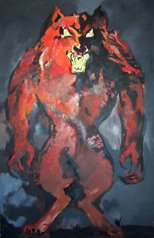“The Battle of New Orleans”
from *Historic Poems and Ballads*
edited by Rupert S. Holland
American
At the same time that British armies were attacking Washington and Baltimore and a British squadron fighting that of Commodore Perry on Lake Erie in the War of 1812, England was fitting out a secret expedition to sail from Jamaica and land in Louisiana. Fifty British ships carried 7,000 British soldiers across the Gulf of Mexico to the channel near the entrance of Lake Borgne, approaching the small city of New Orleans midway between the Mississippi River and Mobile Bay. The fleet anchored there, and easily defeated a few American gunboats, landed their army on an island at the mouth of the Pearl River. They intended to march on New Orleans and capture it by surprise.
Andrew Jackson, a major-general in the American army, had been sent to defend the South from invasion. He reached New Orleans early in December, 1814, and at once began to recruit volunteers. All who would fight the enemy were welcomed to his camp, free negroes were enrolled, convicts were released to become soldiers, the lieutenants of a freebooter named Jean Lafitte, who had made his headquarters at Barataria, and many of his men who had been captured, were freed to join the army. Jackson strengthened the forts of the city and made every preparation to receive the enemy. Five thousand effective fighting men were soon under his command, less than one thousand of whom were soldiers in the regular army.
When the British finally appeared, it was they, and not the Americans, who were surprised. Jackson attacked them as soon as they were in sight, December 23, 1814, and checked their advance. He then entrenched his little force opposite the British, and had them well sheltered by the time the enemy had prepared to give battle. Meantime the British general, Pakenham, had been waiting for larger cannon and reinforcements.
On January 8, 1815, the British advanced, planning to carry the American lines by storm. The British had 10,000 veteran troops, the Americans less than half that number, and most of these raw backwoodsmen. But Jackson's men were born to the use of the rifle, and their firing was wonderfully steady and accurate. The British had to advance over a wide, bare plain, and the American batteries ploughed through their ranks, while the riflemen met them with a raking fire. The veteran English fought with the utmost bravery, the Highlanders flung themselves again and again at the entrenchments, and soldiers who had fought under Wellington in Spain and with Pakenham at Salamanca charged at the blazing line. Pakenham and many of his highest officers were killed, and the British army was finally forced to retreat. They had lost over two thousand men, while the Americans were reported to have lost eight killed and thirteen wounded. It was an overwhelming victory for Andrew Jackson and his volunteers.
The British returned to their ships and sailed away. Neither side knew that a treaty of peace had been signed at Ghent in Brussels two weeks earlier, and that the battle of New Orleans had been fought after the war had ended.
Thursday, January 31, 2008
Subscribe to:
Post Comments (Atom)





No comments:
Post a Comment